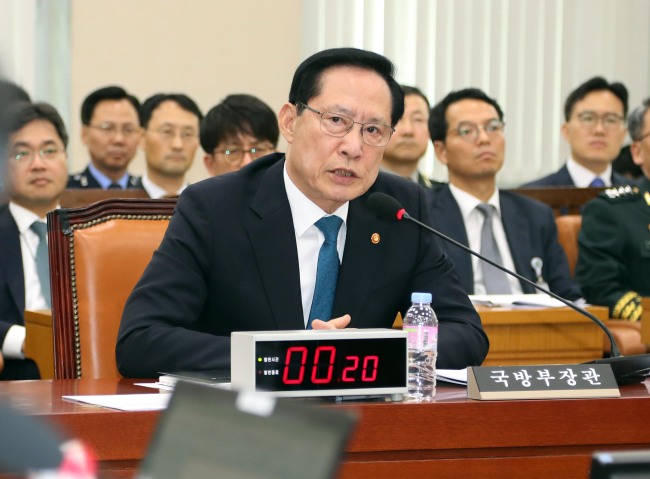Controversy escalated Tuesday over the defense chief’s alleged attempts to delay briefing Cheong Wa Dae on a martial law document, with the defense security commander offering an account that contradicts the defense chief’s explanation.
During a meeting with lawmakers, Defense Security Commander Army Gen. Lee Suk-koo said he had told Defense Minster Song Young-moo that the document was a “grave issue” and Song acknowledged its seriousness during the briefing on March 16.
In the document titled “Wartime Martial Law and Joint Action Plan,” the Defense Security Command said it could consider declaring martial law during a massive protest against former President Park Geun-hye in March last year.
“I told Minister Song that it was serious situation, and he also took it seriously,” said Lee. “Under the instruction of the Defense Ministry, I gathered relevant information and reported them to the minister.”
 |
Defense Minister Song Young-moo. Yonhap |
Song, however, claimed that he was never briefed about the martial law document by Lee. The minister said the document was so thick that he did not have a chance to look at the document thoroughly.
“I told Lee to leave the document behind because it was so thick,” Song told the lawmakers. “I was very busy with my schedule on that day. So I managed to look into the document just before I went home.”
Song has been suspected of holding out on briefing the Blue House for three months after being informed about the martial law document in March. Song reiterated that he made the decision out of “political consideration” amid an inter-Korean detente in the run-up to the April 27 summit.
The revelation came amid mounting controversy over the martial law document drafted by the Defense Security Command, which includes a plan to deploy tanks in downtown Seoul, censor media and block lawmakers from lifting the martial law.
The Defense Security Command’s document is different from the military’s standing plan for declaring martial law, as the former contains much more detailed guidelines on troops deployment, media censorship, change of command and dealing with the National Assembly.
For example, the Defense Security Command’s martial law document stipulates that lawmakers can be arrested if they attempt to revoke martial law. Such measures are strictly banned under the military’s usual martial law plan drafted by the Joint Chiefs of Staff every two years.
“Considering the fact that the Defense Security Command is not the main agency for drafting a martial law plan, I believe it is a serious problem that the Defense Security Command came up with such a detailed plan and document,” DSC Commander Lee said.
Among those detailed plans are deployment of mechanized and special forces units to Gwanghwamun and Yeouido in downtown Seoul, where the country’s legislative and executive bodies are located.
Given that the Defense Security Command’s document contains plans for arresting lawmakers and detailed military maneuvers, Lee acknowledged the possibility that the document might have been drafted under the instruction of higher-ups.
While former Defense Minister Han Min-koo and former Defense Security Commander Cho Hyun-chun have claimed that there were no separate orders from their superiors, doubts persists over whether security aides close to former President Park ordered the military to draw up a martial law plan.
“There is a difference between what I saw and what I heard. … I heard that the (DCS’s martial law document) was drafted under the instruction of those above the DSC commander,” Lee said.
By Yeo Jun-suk(
jasonyeo@heraldcorp.com)








